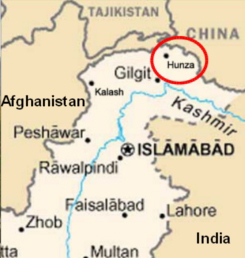Hansamarga
| Author:Laxman Burdak, IFS (R) |

Hansamarga (हंसमार्ग) is a country mentioned in the Mahābhārata (cf. VI.10.68). It is identified with Hunza, a mountainous valley in the Gilgit–Baltistan region of Pakistan.
Origin
Variants
- Hansamarga हंसमार्ग (AS, p.1006)
- Haṁsamārga
- Hamsamarga (हंसमार्ग) Mahabharata (VI.10.68)
- Hansamarga हंसमार्ग (AS, p.1006)
Jat clans
History
Jat History
Hukum Singh Panwar (Pauria)[1] writes that about ancient tribe: Hamsa (Hansamarga or Hans). Height span and girth 96 angulas or 72 inches each, red face shining like gold, plum cheeks, raised nose, round head, eyes like honey, red nails, weight 1600 palas, aged 90 years and rules over Khasas, Surasenas, Gandhara and Antarvedi. Hamsa or Hansa is also an important tribe among the Jats.
Definitions
Source: Cologne Digital Sanskrit Dictionaries: The Purana Index
Haṃsamārga (हंसमार्ग).—A hilly country; watered by the Nalinī; an eastern tribe.
Source: Shodhganga: The Kavyamimamsa of Rajasekhara
Haṃsamārga (हंसमार्ग) or Himsamārga is the name a locality mentioned in Rājaśekhara’s 10th-century Kāvyamīmāṃsā.—Himsamārga is known as the name of Krauñcarandhra or Haṃsadvāra in the Himālaya. This is said to have been opened by Parasurāma with an arrow. It is identified with the Nīti pass in the district of Kumaon, which connecting Tibet with India.
Reference - https://www.wisdomlib.org/definition/hamsamarga
In Mahabharata
Hamsamarga (हंसमार्ग) in Mahabharata (VI.10.68)
Bhisma Parva, Mahabharata/Book VI Chapter 10 describes geography and provinces of Bharatavarsha. Hamsamarga (हंसमार्ग) is mentioned in the list of Other Kingdoms in the south in Mahabharata (VI.10.68). [2]....the Tamaras, the Hamsamargas, and the Karabhanjakas, Mayadeshas. (VI.10.68)
हंसमार्ग
हंसमार्ग (AS, p.1006): हंसों के भारत में आने का मार्ग-- हुंजा (कश्मीर) के इलाके के दर्रे.[3]
External links
See also
References
- ↑ The Jats:Their Origin, Antiquity and Migrations/An Historico-Somatometrical study bearing on the origin of the Jats, p.146
- ↑ तामरा हंसमार्गाश च तदैव करभञ्जकाः, उद्देश मात्रेण मया देशाः संकीर्तिताः प्रभॊ (VI.10.68)
- ↑ Aitihasik Sthanavali by Vijayendra Kumar Mathur, p.1006

